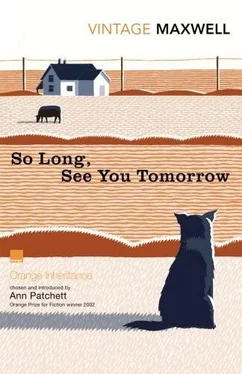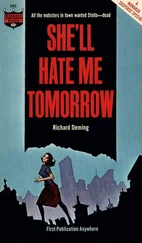In that flat landscape a man cursing at his horses somewhere off in the fields can be heard a long way. All sounds carry: the dinner bell, wheels crossing a cattle guard, the clatter of farm machinery. When the gasoline engine sputters and dies or the blades of the mowing machine jam, Cletus knows that Mr. Wilson, a quarter of a mile away, has heard it and is waiting for the sound of the engine or the mowing machine to start up again. If it doesn't, he leaves his own work and comes across the pasture to see what the trouble is. With their heads almost touching, his father and Mr. Wilson study the difficulty. Wrenches and pliers pass back and forth between them with as much familiarity as if they owned their four hands in common.
In midsummer, with thunderheads blotting out more and more of the blue sky, it could be his father's hay that they are tossing up onto the wain or it could be Mr. Wilson's. They know, of course, but it is beside the point. When the haymakers no longer cast a shadow it means that the sun has gone under a huge, ominous, dark grey cloud. A breeze springs up and they work faster. They don't even so much as glance at the sky. They don't need to. The precariously balanced load grows higher and higher. When the wagon won't hold any more they climb up onto it and race for the barn, and with the first raindrops pattering on the oak leaves they congratulate themselves on getting the hay under cover in time. This happens not just once but year after year.
So far as Clarence Smith was concerned, no other man had ever shown a concern so genuine or so dependable, and he did his best to pay it back in kind. When Lloyd Wilson had a sick calf, instead of calling the vet he got Clarence to come and look at it, and Clarence stayed up all night doctoring the animal and keeping it warm with blankets. In the morning Cletus woke up early and threw the covers off and dressed and ran all the way to the barn where they were, and got there in time to see the calf struggle to his feet. His father said, "I guess that's that," and brushed Mr. Wilson's thanks aside, and they went home.
And when his father gets behind in his spring plowing because of the rains, Mr. Wilson joins him after supper with his horse and plow and together they turn over the soil in the lower forty by moonlight.
Cletus thinks of it as their lower forty; actually, it is someone else's. Land, barns, sheds, farmhouse — everything but livestock and machinery — belong to Colonel Dowling, whose snub-nosed Franklin is often parked by the entrance to the lane. The crops that are planted and the price at which they are sold await his decision. The lightning rods on the roof of the house and both barns are his idea. It is right, of course, to put your trust in the Lord. But in moderation. Things that people can manage without His help He shouldn't be asked to take care of. After the time the Franklin got so badly mired in the lane that his tenant had to come with a team and pull him out, Colonel Dowling doesn't put his entire trust in the Franklin either, but tells himself it is just as easy to leave the car by the side of the road and walk in.
He is a self-made man. His father was a hod carrier who drank more than was good for him, and fell off a scaffolding and broke his neck, leaving his widow with six children to bring up. She did it by taking in washing. As Ed Dowling fought his way up in the world, he married a woman with money and made himself into a gentleman. It was no small accomplishment, but it cut him off somewhat from his brothers and sisters, who are not above making fun of him behind his back.
A gentleman doesn't have one set of manners for the house of a poor man and another for the house of someone with an income comparable to his own. He never enters the farmhouse without knocking. Even though it is legally his. And he remembers to wipe the spring mud off his shoes. He also makes a point of asking Cletus's mother if she is satisfied with the present arrangements, and this could lead to, if she thinks the kitchen needs repainting, his offering to supply the paint. He is always courteous to her and he knows the boys' names. If that is all he knows about them, it is not greatly to be wondered at. One farm boy is very much like another. The cat has invariably got their tongue.
Satisfied that his tenant's wife is a good housekeeper, he shows no interest in the second floor, and therefore doesn't know about the broken-backed copy of Tom Swift and. His Flying Machine that is lying open, with the pages to the floor, in the fluff under the bed in the small room on the right at the head of the stairs.
Colonel Dowling is older than Cletus's father, and has snow-white hair, and Cletus finds it natural that when they stand talking by the pump or when they walk over the fields together his father calls the older man "Colonel" and Colonel Dowling calls his father "Clarence." But sometimes the Colonel brings a friend with him, somebody from town who doesn't know the first thing about farming, and with Cletus's father standing right there he will say "my corn" or "my oats" or "my drainage ditch." If he says it often enough, Cletus drops behind out of earshot. Even if his father, after working these acres for twelve years, doesn't feel the emotion of ownership, Cletus does.
Another card, from that same pack: his brother Wayne, who is eight years younger than he is. Wayne and Cletus are as different as day and night, people say. Or, to put it differently, as different as the oldest child and the second one often are.
Watching his mother as she holds Wayne's chin in her hand and parts his hair with a wet comb, Cletus remembers that she used to do this to him.
All the way home from school there are clouds racing across the sky and the air is warm and humid. Wayne is sitting on the porch steps when Cletus rides into the yard. He has pulled a strawberry box apart and is making an airplane with the pieces of thin wood. As Cletus steps over him he bends down and tries to take it from him in order to make an improvement, but Wayne jerks it back.
"Aunt Jenny is here," he says. "Somebody gave her a ride out from town. And we're having strawberry shortcake for supper."
Except for Jenny Evans, who is her mother's sister, Fern Smith has no living relatives. Her mother died when she was three and her father gave her to Aunt Jenny to bring up and went out West, where he found a job on a cattle ranch in Wyoming. From time to time he sent money, never very much. Now he is dead too. So is Tom Evans, Jenny's husband.
As people get older they get more alike in character and appearance and could all be leading the same life. Or almost. Shut up in the little house opposite the fairgrounds, Aunt Jenny talks to the hot-water faucet that drips, and the kitchen drawer that has a tendency to stick. She also sings, hymns mostly, in a high quavering voice: "That Old Rugged Cross" and "Art Thou Weary, Art Thou Sad" and "How glorious must the mansions be / Where thy redeemed shall dwell with thee. . " Without meaning to, she has grown heavy but she eats so little that short of starving to death there doesn't seem much she can do about it. Sometimes she goes out to work as a practical nurse, and comes home and sits by the kitchen table soaking her feet in a pan of hot water and Epsom salts. When she gets into bed and the springs creak under her weight, she groans with the pleasure of lying stretched out on an object that understands her so well.
The face that passes in and out of the small unframed mirror over the kitchen sink is that of an old woman whose chin has hairs on it, whose teeth spent the night in a glass of water, whose glasses are bifocal, causing her to step down into space if she isn't careful. She is full of fears, which are nursed by the catastrophes she reads about in the paper. The front and back doors are locked day and night against bad boys, a man with a mask over the lower part of his face, pneumonia, a fall. There is, even so, something buoyant in her nature that makes people pleased to see her coming toward them on the street, and usually they stop to talk to her and hear about the catastrophes. She winds up the conversation by saying cheerfully, "Life is no joke." What sensible person wouldn't agree with her.
Читать дальше












